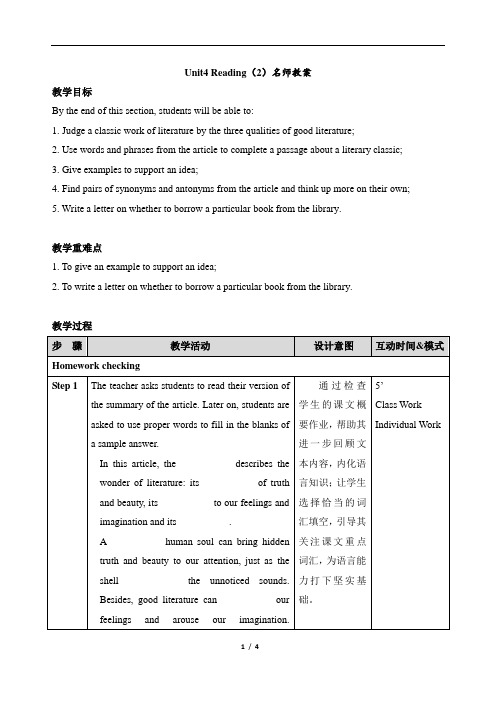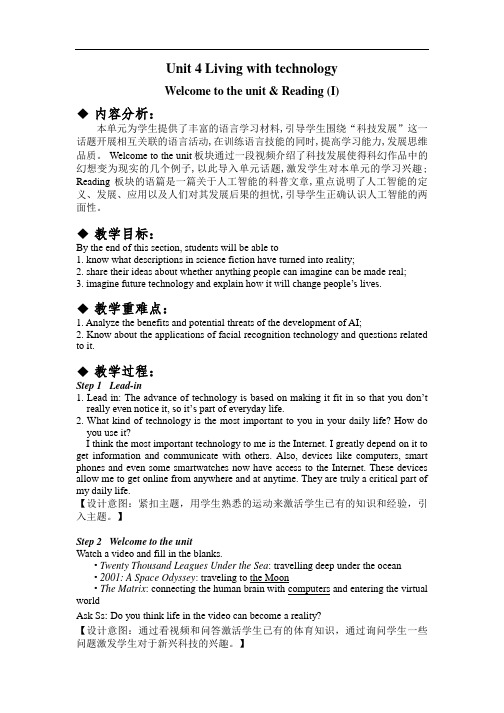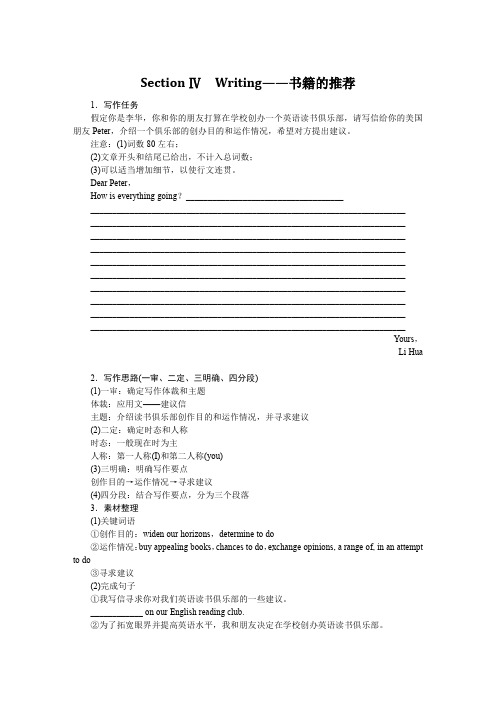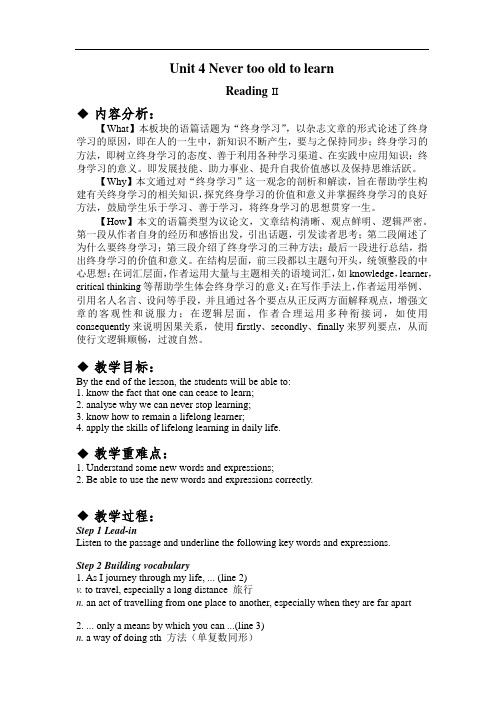译林版高中英语必修二Uint4 Reading (II) 教案(雅礼版)
译林版高一英语必修第二册(2019版)-Unit4-Reading(2)名师教案

10’
Group Work
Step 6
Students have a group discussion about the meanings and functions ofantonyms and synonyms. Later on,studentsfind all the pairs of antonyms and synonyms in the article and thinkupmore on their own.
Individual Work
Application
Step 3
Students finish B1 on Page 47 and try to answer the following two questions.
What quality of good literature is illustrated in this passage? How does the author illustrate this quality?
In this article, the __________ describes the wonder of literature: its __________of truth and beauty, its __________ to our feelings andimagination and its __________.
Appreciation
Step 5
Students have a group discussion about the function of examples. Later on,studentsfind the examples used in the article and finish B3 onPage 47.
译林版高中英语选必二Unit4 Reading I 教案(雅礼版)

Unit 4 Living with technologyWelcome to the unit & Reading (I)◆内容分析:本单元为学生提供了丰富的语言学习材料,引导学生围绕“科技发展”这一话题开展相互关联的语言活动,在训练语言技能的同时,提高学习能力,发展思维品质。
Welcome to the unit板块通过一段视频介绍了科技发展使得科幻作品中的幻想变为现实的几个例子,以此导入单元话题,激发学生对本单元的学习兴趣; Reading板块的语篇是一篇关于人工智能的科普文章,重点说明了人工智能的定义、发展、应用以及人们对其发展后果的担忧,引导学生正确认识人工智能的两面性。
◆教学目标:By the end of this section, students will be able to1. know what descriptions in science fiction have turned into reality;2. share their ideas about whether anything people can imagine can be made real;3. imagine future technology and explain how it will change people’s lives.◆教学重难点:1. Analyze the benefits and potential threats of the development of AI;2. Know about the applications of facial recognition technology and questions related to it.◆教学过程:Step 1 Lead-in1.Lead in: The advance of technology is based on making it fit in so that you don’t really even notice it, so it’s part of everyday life.2.What kind of technology is the most important to you in your daily life? How do you use it?I think the most important technology to me is the Internet. I greatly depend on it to get information and communicate with others. Also, devices like computers, smart phones and even some smartwatches now have access to the Internet. These devices allow me to get online from anywhere and at anytime. They are truly a critical part of my daily life.【设计意图:紧扣主题,用学生熟悉的运动来激活学生已有的知识和经验,引入主题。
译林版高中英语M4U2reading教学设计

②What is theOlympic theme song?
③Do you know thethree wordsshow the spiritof the Olympic Games?
④Who are theformerand the present president of IOC?
When the debate begins, write down their opinions.
Presentthetwo groups of supportingdetailsof the debate.
Conclusion:Emphasis on the idea that not everything is perfect andholding a Olympic Gamesis no exception.
Teaching methods
1. Task-based activities
2.Question-and-answer activity
3. Freediscussionmethod
Teaching aids
The blackboard, the multi-mediaanda tape recorder
Step6Discussion : A Mini-debate
Hold a debate“What are the advantages and disadvantages of holding the 2008 Olympic Games?
Divide the class into two groups. One is for the idea, and the other is against it. Each reason makes one score. The group which gets more scoreswill win.
译林版高中英语必修二Uint4 Grammar and usage (II) 教案(雅礼版)

Unit 4 Exploring literatureGrammar and usage 2Modal verbs◆内容分析:本板块围绕单元话题,首先引导学生在有关“如何选书”的语篇中观察、探究情态动词can、could、might、must、shall、should、ought to等在文中的使用,归纳出情态动词的核心规则;再通过句子、语篇两个层面的巩固练习,让学生内化情态动词的相关知识;最后让他们运用所学,准确、恰当、得体地使用情态动词,完成提建议、制定规章制度等任务,实现“形式--意义--使用”三者的统一。
◆教学目标:By the end of this section, students will be able to:1.identify and categorize the usage of modal verbs;2.summarize general rules of modal verbs;3.distinguish and use the right modal verbs to finish tasks of offering suggestionsand making rules;◆教学重难点:1.To identify the usage of modal verbs;2.To use the modal verbs correctly and properly;◆教学过程:Step 1 Review常见的情态动词Modal verbs(4组)can/could, may/might, shall/should, will/would(4对)have to, had better, ought to, used to(3个)must, need, dareStep 2 Applying the rules P49B1 For the following groups of three sentences, tick the sentence which uses themodal verb differently from the other two.1.a Can I keep the book for more than two weeks?b Nick can read more in an afternoon than I can in a week!c Can Mary finish War and Peace in a month?2.a I am afraid I may be unable to finish this novel today.b It may be difficult for people to agree on what good literature is.c You may go to the library tomorrow afternoon, if you have time.3.a I must finish writing the book review and hand it in before Wednesday.b You must be tired afte r three hours’ reading.c Students must develop the habit of reading classic literature.4 a Henry should be reading books in the library.b I have fifty dollars—that should be enough for three books.c Reading English novels has greatly increased my vocabulary—you should try it too.Answer:1. a2. c3. b4. c【设计意图:通过总结归纳,让学生识别情态动词的不同用法。
高中英语译林版《必修第二册》教案讲义:Unit 4 Exploring literature

SectionⅣWriting——书籍的推荐1.写作任务假定你是李华,你和你的朋友打算在学校创办一个英语读书俱乐部,请写信给你的美国朋友Peter,介绍一个俱乐部的创办目的和运作情况,希望对方提出建议。
注意:(1)词数80左右;(2)文章开头和结尾已给出,不计入总词数;(3)可以适当增加细节,以使行文连贯。
Dear Peter,How is everything going?____________________________________________________________________________________________________________________________________________________________________________________________________________________________________________________________________________________________________________________________________________________________________________________________________________________________________________________________________________________________________________________________________________________________________________________________________________________________________________________________________________________________________________________________________________________________________________________Yours,Li Hua 2.写作思路(一审、二定、三明确、四分段)(1)一审:确定写作体裁和主题体裁:应用文——建议信主题:介绍读书俱乐部创作目的和运作情况,并寻求建议(2)二定:确定时态和人称时态:一般现在时为主人称:第一人称(I)和第二人称(you)(3)三明确:明确写作要点创作目的→运作情况→寻求建议(4)四分段:结合写作要点,分为三个段落3.素材整理(1)关键词语①创作目的:widen our horizons,determine to do②运作情况:buy appealing books,chances to do,exchange opinions,a range of,in an attempt to do③寻求建议(2)完成句子①我写信寻求你对我们英语读书俱乐部的一些建议。
译林版高中英语选必四Unit4 Reading II 教案(雅礼版)

Unit 4 Never too old to learnReading II◆内容分析:【What】本板块的语篇话题为“终身学习”,以杂志文章的形式论述了终身学习的原因,即在人的一生中,新知识不断产生,要与之保持同步;终身学习的方法,即树立终身学习的态度、善于利用各种学习渠道、在实践中应用知识:终身学习的意义。
即发展技能、助力事业、提升自我价值感以及保持思维活跃。
【Why】本文通过对“终身学习”这一观念的剖析和解读,旨在帮助学生构建有关终身学习的相关知识,探究终身学习的价值和意义并掌握终身学习的良好方法,鼓励学生乐于学习、善于学习,将终身学习的思想贯穿一生。
【How】本文的语篇类型为议论文,文章结构清晰、观点鲜明、逻辑严密。
第一段从作者自身的经历和感悟出发,引出话题,引发读者思考;第二段阐述了为什么要终身学习;第三段介绍了终身学习的三种方法;最后一段进行总结,指出终身学习的价值和意义。
在结构层面,前三段都以主题句开头,统领整段的中心思想;在词汇层面,作者运用大量与主题相关的语境词汇,如knowledge,learner,critical thinking等帮助学生体会终身学习的意义;在写作手法上,作者运用举例、引用名人名言、设问等手段,并且通过各个要点从正反两方面解释观点,增强文章的客观性和说服力;在逻辑层面,作者合理运用多种衔接词,如使用consequently来说明因果关系,使用firstly、secondly、finally来罗列要点,从而使行文逻辑顺畅,过渡自然。
◆教学目标:By the end of the lesson, the students will be able to:1. know the fact that one can cease to learn;2. analyse why we can never stop learning;3. know how to remain a lifelong learner;4. apply the skills of lifelong learning in daily life.◆教学重难点:1. Understand some new words and expressions;2. Be able to use the new words and expressions correctly.◆教学过程:Step 1 Lead-inListen to the passage and underline the following key words and expressions.Step 2 Building vocabulary1. As I journey through my life, ... (line 2)v. to travel, especially a long distance 旅行n. an act of travelling from one place to another, especially when they are far apart2. ... only a means by which you can ...(line 3)n. a way of doing sth 方法(单复数同形)by means of 通过...方法by all means 当然可以by no means 绝不单复数同形常见词:Chinese, Japanese, sheep, deer, works(工厂), series➢Practice makes perfect.Television is _______ effective means of communication.All the means _________________(try) up to now.She is _______ no means an inexperienced teacher.3. ... should not be perceived as a weekness...(line 5)v. to notice sth 注意到...v. to understand sb/sth in a particular way 将...理解为...perceive sb/sth as sthperceive-perception➢Practice makes perfect.She did not perceive ________(she) as disabled.This discovery was perceived _____ a major breakthrough.I perceived _____ change in her behaviour last week.There is a general public __________(perceive) that standards in schools are falling.4. When I drew a still life, ... (line 7)adj. not moving; calm and quiet 静止的;平静的adj. with no wind 无风的➢Practice makes perfect.The kids found ______ hard to keep still.We stayed in a village ________ time has stood still.翻译:Still waters run deep.5. As you progress through life,.... (line 12)v. to improve or develop over a period of time 改进;进展v. to move forward 前进;行进v. to go forward in time (时间上)推移,流逝➢Practice makes perfect.The course allows students ___________(progress) at their own speed.The line of traffic ___________(progress) slowly through the town in rush hours. The weather became colder as the day _________(progress).6. ... be exposed to many new ideas, beliefs...(line 14)常见以f结尾,直接加s变成复数的名词海湾(gulf)悬崖(cliff)屋顶上(roof),首领(chief)奴仆(serf)一起望,谁说他们无信仰(belief),证据(proof)就在手帕上(handkerchief)。
译林版高中英语必修二Uint4 Reading (I)教案(雅礼版)

Welcome to the unit & Reading (I)
内容分析:
本单元的主题语境是“人与社会”,话题是“文学作品”,涉及的语篇类型有:议论文、推荐信、小说(节选)、海报。本单元的教学,旨在帮助学生认识阅读文学作品的意义,体验文学作品的魅力。
3.Rhetorical, anadiplosis and simile and other rhetorical devices are introduced in different paragraphs.
【设计意图:考察学生对文本细节的理解】
Step 5 Discussion
Read paras. 3–6 and figure out the pattern of the structure.
2.Reading for structure: PEEL structure
PEEL: point, explain & expand, example & evidence and link.
David CopperfieldandThe House on Mango Streetare distinctively two types of books. However, these two excerpts both express a positive outlook in the face of adversity.
Step 4 Detailed Reading
1.Read and figure out the answers.
Read paras. 1-2 and answer the questions.
译林版高中英语必修二Uint4 Project 教案(雅礼版)

Unit 4 Exploring literatureProjectMaking a poster about a writer◆内容分析:本板块围绕单元话题,以“制作一张关于作家的海报”为主要目的,介绍了中外各个时期的著名作家,并且带动学生们思考应从哪几个角度来介绍作家。
通过一起赏析优秀的海报,总结出海报的相关特点,鼓励同学们积极动手,团队合作,一起制作海报。
◆教学目标:By the end of this section, students will be able to:1.know more about the writers at home and abroad;2.know what topics are valuable when making a poster;3.tell what makes a good poster;4.know how to make a poster.◆教学重难点:1.To tell students many famous writers at home and abroad;2.To help students conclude what makes a good poster;3.To teach students how to make a poster.◆教学过程:Step 1 Lead-inQ1:Do you know any ancient or modern Chinese writers?Spring and Autumn Period and Warring States PeriodLearning without thinking leads to confusion; thinking without learning ends in danger.Confucius The road ahead is long and has no ending; yet high and low I will search with my will unbending.Qu Yuan Neither riches nor honors can corrupt him; neither poverty nor humbleness can make him swerve from principle; and neither threats nor forces can subdue him.Mencius And then introduce one or two famous writers in each dynasty.Han Dynasty, Jin Dynasty, Tang Dynasty, Song Dynasty, Yuan Dynasty, Ming and Qing Dynasties, The Modern and contemporary writers.Q2: Do you know any ancient or modern English writers?And then introduce some famous writers during each period.Old English Period, The Renaissance Period: a period of drama and poetry,Neoclassical period(17th), The Romantic Period, The Victorian Period, The Modernism Period.Q3: Do you know any ancient or modern American writers?And then introduce some famous writers during each period.Colonial Period, Romantic Period, Realism Period, Modernism Period, Post-war Period.Step2 How to make a posterQ1: If you are going to introduce your favorite writer, either Chinese or other countries’, who will you choose? Why?Possible answer: I will choose Pearl Sydenstricker Buck because she was an award-winning American writer, who won the Nobel Prize in Literature for her rich and truly epic descriptions of peasant life in China and for her Biographical masterpieces.Q2: How to introduce the writer comprehensibly?Possible answers:Make a bookletMake a scrapbookMake a PPTMake a poster…Let’s make a poster about a writer.Take Pearl Sydenstricker Buck as an example.Step3 Topics to include in your posterPossible answer: life story, works, sayings, achievements, …Conduct further research about these topics in groups.And then introduce these topics about Pearl Sydenstricker Buck.Achievements:•Won the Pulitzer Prize in 1932•Won the Nobel Prize in Literature in 1938( the first American woman to win the prize)Most popular works:•The Good Earth(1931)•Sons(1932)• A House Divided(1935)•All Men Are Brothers( a translation of the Chinese classic novel Shuihuzhuan) Life story•Lived in Zhenjiang during her early life;•Started writing in 1922•Taught English literature in Nanjing•Returned to the USA in 1935Famous sayings:•“All things are possible until they are proved impossible and even theimpossible may only be so, as of now.”•“many people lose the small joys in the hope for their big happiness.”Put together your information to make your poster.Step4 What make a good posterQ1: What occasions do people usually use posters for ?Possible answers: Events, movies, commercial advertisements, public service a dvertisements,…Q2: What adjectives would you use to describe a poster that attracts your attention most?Possible answers: Theme-focused, accurate, simple, organized, eye-catching, neat, colorful, etc.And then show an example to students. At the same time, give some tips on giving a presentation:When giving a presentation, you need to:•speak clearly and confidently;•make eye contact with your audience;•talk at a proper speed and pause when it is necessary to give your audience time to think about what you have said;•keep your facial expressions relaxed and friendly.教学反思。
- 1、下载文档前请自行甄别文档内容的完整性,平台不提供额外的编辑、内容补充、找答案等附加服务。
- 2、"仅部分预览"的文档,不可在线预览部分如存在完整性等问题,可反馈申请退款(可完整预览的文档不适用该条件!)。
- 3、如文档侵犯您的权益,请联系客服反馈,我们会尽快为您处理(人工客服工作时间:9:00-18:30)。
Unit 4 Exploring literature
Reading (II)
◆内容分析:
本板块的话题是“文学作品”。
Reading板块引导学生探究优秀文学作品的特征,思考阅读文学作品的好处。
语篇节选改编自英语作家威廉·约瑟夫·朗恩的著作《英语文学:历史及其对英语世界生活的意义》。
文章介绍了文学作品的定义和功能,描述了优秀文学作品的三大特点:即刻画真与美,让读者产生共鸣并激发其想象,以及拥有经久不衰的生命力。
◆教学目标:
By the end of this section, students will be able to:
1.find the three qualities of literature by skimming the article;
2.give an example to support an idea;
3.point out the cohesive devices applied in the article;
4.appreciate beautiful sentences from the article; understand the significance of
reading literature in daily life.
◆教学重难点:
1.understand some new words and expressions.
2.be able to use the new words and expressions correctly.
◆教学过程:
Step 1 Lead-in
Read and underline the following key words and expressions.
amaze, unnoticed, in store for sb., appeal to, be capable of, awaken, in the presence of, permanence, adapt
Step 2 Building vocabulary
1. Word study: amaze
Introduce the meaning of “amaze” through different situations, first the context of the speech and then other situations.
(1) Different meanings of amaze
(2) Collocations of amaze
(3) Variations of the word “amaze”
(4) Exercises of amaze: Practice makes perfect.
2. Word study: unnoticed
Introduce the meaning of “unnoticed” through different situations, first the context of the speech and then other situations.
Example sentences that include the word “unnoticed”
3. Word and phrase study: in store for sb
Introduce the meaning of “in store for” through different situat ions, first the context of the speech and then other situations.
(1) Collocations of “in store for”
(2) Exercises of “in store for”: Practice makes perfect.
4. Word and phrase study: appeal to
Introduce the meaning of “appeal to” through different situati ons, first the context of the speech and then other situations.
5. Phrase study: be capable of
Introduce the meaning of “be capable of” through different situations, first the context of the speech and then other situations.
6. Word study: awaken
Introduce the meaning of “awaken” through different situations, first the context of the speech and then other situations.
(1) Different meanings of awaken
(2) Collocations of awaken
(3) Exercises of awaken: Practice makes perfect.
7. Phrase study: in the presence of
Introduce the meaning of “in the presence of”.
8. Word study: permanence
Introduce the meaning of “permanence” through different situations, first the context of the speech and then other situations.
(1) Different meanings of permanence
(2) Collocations of permanence
(3) Exercises of permanence: Practice makes perfect.
9. Word study: adapt
Introduce the meaning of “adapt” through different situations, first the context of the speech and then other situations.
(1) Different meanings of adapt
(2) Collocations of adapt
(3) Exercises of adapt: Practice makes perfect.
Sentence analysis
Let a little song appeal to the ear, or a great book to the heart, and we discover a new world, a world of dreams and magic. (lines 8-9)
Sentence translation
Consolidation
1. Exercises to review the knowledge learned
2. Check the answers of B1 on P47
教学反思。
